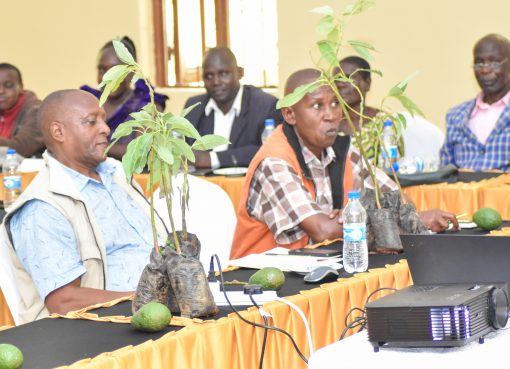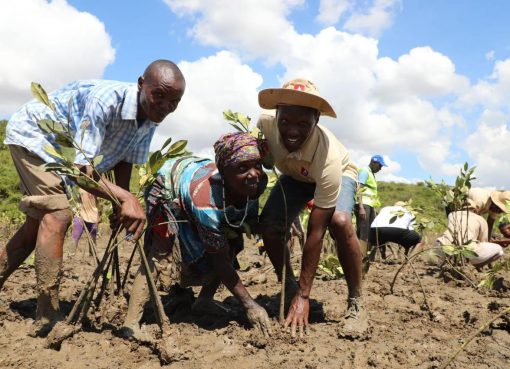Small holder poultry farmers in Nakuru have benefitted from a joint collaboration between the Ministry of Agriculture and the County government aimed at empowering them to produce 1.5 million eggs worth Sh15 million monthly.
Governor Lee Kinyanjui said through the partnership aimed at improving breeding and multiplication of indigenous chicken, poultry farmers in Njoro and Bahati sub-counties had received 1,000 improved ‘Kienyeji’ chicks from the State Department of Livestock and Range Management.
He said under this county poultry program, 29,000 one month old chicks had been distributed to farmer groups across the 11 sub-counties.
At the same time, the governor stated that poultry farmers within the devolved unit last year netted Sh875 million from the sale of 67 million eggs.
He revealed that a further Sh489 million was earned from sale of 825 and 340 tons of chicken and turkey meat respectively.
“The project has been fashioned to promote urban agriculture while ensuring the use of limited available space to feed the growing population in urban centers. Our ultimate goal is to achieve food security and nutrition as well as create employment.
We want to improve the livelihoods of Nakuru people mainly through women and youth. The project will enable them to take care of the needs of their families. It will also help them pay school fees for their children,” said Kinyanjui.
Blaise Okinyi from the State Department of Livestock, Range Management Division said the programme targets to have farmers rear improved kienyeji chicken varieties that start laying eggs only five months after being hatched and produce an average meat weight of 1.5kg, while a cock should weigh at least 2kg.
“Farmers are expected to use the dual purpose breeds to improve their local chicken in addition to increasing their production. This will address challenges of poor breeds, low production while generating income for the communities.

The initiative is supporting the National Government’s program to achieve food and nutrition security under the Big 4 Agenda” observed Mr Okinyi
Okinyi said traditional indigenous chickens make about 76 per cent of the total poultry population in Kenya and produce about 55 and 47 per cent of the total meat and eggs.
“Improved indigenous chickens have advantages over traditional ones because the former has undergone intensive selective breeding by primary breeders to ensure optimum performance in terms of increased egg production and higher cold dressed weight. This Indigenous chicken breeding and multiplication program has been unveiled at a time the country is witnessing high market prices for indigenous chicken products,” he observed.
To ensure that the small holder farmers realize optimum production, the county government has attached a veterinary and a livestock extension officer to the project who will equip the breeders with necessary technical advice such as how to feed the birds and administer vaccines.
Statistics from the Ministry of Agriculture indicate that Kenya has an estimated poultry population of 31million birds. Out of these, 75 per cent consist of indigenous chicken, 22 percent of broilers and layers and one per cent of breeding stock. The traditional chicken is mostly kept in rural areas while layers and broilers are mainly reared in the urban areas.
Country Executive Committee Member for Agriculture, Livestock and Fisheries Dr. Immaculate Maina said her department had embarked on supporting the poultry value chain through distribution of 10,000 fertilized eggs to 28 farmer groups.
She said 110 Cooperative societies had received 96 automatic chicken incubators and backup generators valued at Sh6.8 million, while in Bahati Sub-County 6 poultry farmers’ cooperatives had each received a 3,200 egg capacity incubator to boost their operations.
Nakuru now has approximately 1.5 million indigenous chicken, 18,300 improved Kienyeji breed, 212,200 layers, 275,900 broilers, 44,000 turkeys, 73,000 ducks and 14,500 geese.
The County is exploring the possibility of intensifying poultry vaccination in order to cushion small-scale farmers against the high vaccination costs as well as the high disease outbreaks,” said the CEC.
Dr. Maina said her department was also collaborating with Kenya Agricultural Livestock Research Organization (KALRO) in ensuring that more farmers got improved Kienyeji chicken breeds that were high yielding, fast maturing, easy to maintain and disease resistant that have the ability to lay 220-280 eggs in a year, double the yield capacity of ordinary indigenous chicken.
KALRO has previously distributed about 1.5 million day old chicks to farmers in Nakuru. More than 700,000 farmers have been trained on basic disease control and management mechanisms and best practices in poultry farming.
The poultry sub-sector has the potential to transform Kenya’s economy and improve the well-being of Kenyans. Agriculture contributes 26 per cent of the Gross Domestic Product (GDP) directly and 27 per cent indirectly in Kenya, 30 percent of this comes from the poultry sub-sector. This is a big contribution to Kenya’s GDP,” said Dr. Maina
She stated that current statistics from the National Farmers Information System (NFIS) indicate that an egg from indigenous chicken retails for Sh25-30 compared to those from hybrid layers which trade for Sh12-15 per egg. A 3kg indigenous chicken, according to NFIS retails for Sh600-800 with the price likely to be higher in major cities like Nairobi, Mombasa and Nakuru.
By Anne Mwale





